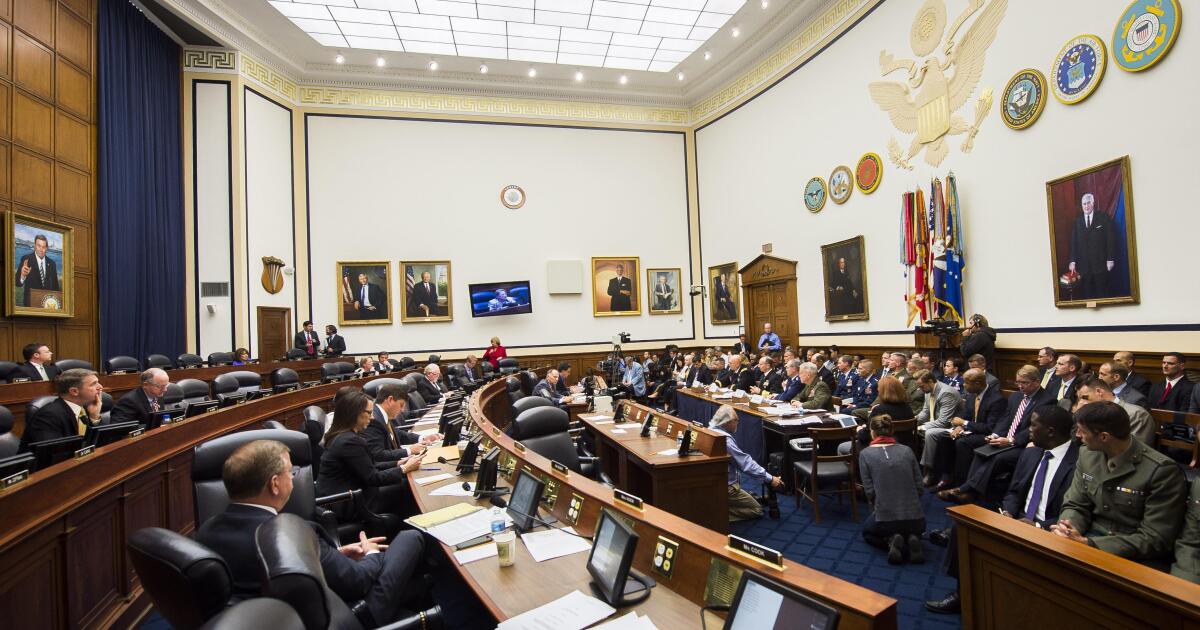

House Republican leaders say investigations of politically sensitive targets such as presidential son Hunter Biden will be a top priority when they’re in power. But the House Armed Services Committee is likely to steer clear of partisan food fights.
The House Armed Services Committee, like its cross-Capitol counterpart, the Senate Armed Services Committee, has traditionally been a bastion of bipartisanship in an increasingly divided Congress. And the incoming House Armed Services Committee chairman, Rep. Mike Rogers (R-AL), wants to keep it that way.
HOUSE ARMED SERVICES COMMITTEE PASSES DEFENSE SPENDING BILL WITH $37 BILLION BUMP
That would mean skipping or at least minimizing targets likely to raise the hackles of Democrats on the committee, which is responsible for funding and oversight of the Department of Defense and the armed forces. Its National Defense Authorization Act sets military policy and spending levels for the Pentagon and other agencies in the country’s national defense infrastructure. The NDAA has been enacted into law each year since 1962, a 60-year run in which the House majority has flipped back and forth between Republicans and Democrats several times.
Rogers himself has, as the committee’s top Republican for the past two years, raised issues that could become partisan fodder. That includes actions by members of the Biden administration in the chaotic U.S. withdrawal from Afghanistan. And COVID-19 vaccine mandates, which led to the departure from the military of thousands of otherwise healthy service members. And claims of “wokeism” in the military, including Democratic proposals to extend the military draft to women and mandating coronavirus vaccines.
But none of that was mentioned in a statement by Rogers to the Washington Examiner about his top priorities upon becoming chairman. That will happen when the new Congress opens on Jan. 3, 2023, after Republicans in the midterm elections won a narrow House majority, 222-213.
“Capability and lethality are the two most important aspects of a successful military,” Rogers said. “China has spent the last decade focusing on both. To maintain the U.S.’s position as the world’s most capable and lethal fighting force, we must continue to make investments in everything from the warfighter to the weapons they wield.”
Keeping active service members in the military is another priority, said Rogers, a lawyer by background who was first elected to the House in 2002 after stints as a state lawmaker and Calhoun County commissioner.
“The United States has an incredible all-volunteer force, but it needs to be competitive with the private sector as a career — that means improving the quality of life for our enlisted service members and their families,” said Rogers, who represents the east-central Alabama 3rd Congressional District.
Rogers’s comments don’t preclude investigations into the first two years of the Biden administration or anything that has yet to occur. But they do represent a divergence from some House Republican colleagues eager to begin oversight on issues touching the military realm.
Rep. Mike Turner (R-OH), a member of the House Armed Services Committee and the presumed new chairman of the House Intelligence Committee, has discussed renewed oversight of the U.S. withdrawal from Afghanistan in late August 2021. The Armed Services Committee, Turner said, needs to focus on the crunch that the war in Ukraine has caused on U.S. stockpiles and the defense industry while also focusing on the nuclear threat from adversaries like Russia, North Korea, China, and Iran.
“The Ukrainian conflict has consumed a significant amount of our stored systems to be able to respond to Ukraine’s continued needs and consumption, backfill our needs, and then respond to our allies who now see that forward positioning of weapons really make a huge difference for the outcome in the initial days with conflict,” Turner told the Washington Examiner in an interview. “This is going to take significant investment to switch to a production mode for our industrial base.”
Rep. Seth Moulton (D-MA), another House Armed Services Committee member, said the panel’s top priority is the need “to modernize rapidly to meet the China threat.” Moulton said he believes Rogers, a committee colleague for years, “is up for the challenge” of making “some tough cuts of current systems to make room for new systems.”
Moulton described the committee as “one of the most bipartisan committees in Congress.” Under Republican leadership, Moulton said, he “wouldn’t be surprised to see some tougher oversight on issues like, for example, Afghanistan, where we should have oversight of the withdrawal. But we should also have congressional oversight of the last 20 years of Afghanistan.”
In a narrowly divided Congress, Moulton said, “I’m always concerned about partisanship from the Republicans.” But in general, Moulton added, “the partisanship I hear on defense issues is not from members of the Armed Services Committee.”
Michael O’Hanlon, director of research in foreign policy at the Brookings Institution, also downplayed partisan divides and highlighted that “it’s pretty striking” how much “agreement there is on the basic size, structure, posture, or budget of the American armed forces.” Added O’Hanlon, in an interview with the Washington Examiner, “We’ve got to remember one of our strengths has been a fair amount of agreement on some core principles of U.S. defense policy, and none of that’s really changed.”
CLICK HERE TO READ MORE FROM THE WASHINGTON EXAMINER
The relative across-the-aisle cooperation expected in the House Armed Services Committee is likely to be a stark difference from other panels in the new Republican majority.
Reps. Jim Jordan (R-OH), who is in line to chair the House Judiciary Committee, and James Comer (R-KY), who is expected to lead the House Oversight Committee, recently held a press conference after the GOP won the House in which they announced their intent to investigate President Joe Biden’s son, Hunter Biden, whose professional business dealings have long incurred significant scrutiny, specifically from conservatives. Additionally, House Minority Leader and aspiring Speaker Kevin McCarthy (R-CA) has already called for Homeland Security Secretary Alejandro Mayorkas to resign over what Republicans call mismanagement of the U.S.-Mexico border. McCarthy threatened that a Republican-led House could impeach Mayorkas if he doesn’t leave voluntarily.
One repeat criticism from many Republicans, mainly those not on the House Armed Services Committee, as Moulton noted, is that the military is pushing diversity and inclusion at the expense of traditional fighting readiness.
Rep. Chip Roy (R-TX) and Sen. Marco Rubio (R-FL) released a joint report earlier in November deriding the Biden administration’s emphasis on diversity and inclusion, which Republicans have argued takes away from the military’s main purpose of defending the homeland from external threats.
The 18-page report, “Woke Warfighters: How Political Ideology is Weakening America’s Military,” rebukes military academies for supposedly teaching critical race theory, a decades-old concept from law schools that claims U.S. institutions were created with the implicit design to keep whites ahead of minorities. The military’s efforts to promote LGBT individuality and its providing additional inclusivity for trans people have also drawn GOP scrutiny.






